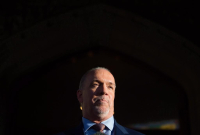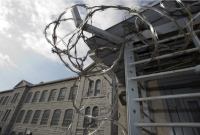Support strong Canadian climate journalism for 2025
Canadian activists lobbying for gender-neutral options on government documents say Ottawa has sent an important message in support of their cause by announcing the arrival of passports that allow people to opt out of declaring themselves as either male or female.
The federal government had long indicated that gender-neutral passports were on their way, but formally announced the move on Thursday. Canadians who don't want to specify a male or female gender will now have the option to indicate their preference on passport application forms starting on Aug. 31.
Those who want to take advantage of the new rule will have to write an observation on their form saying they'd like to see their gender identified as "x" before new forms can be printed offering the neutral option alongside "m" and "f."
Activists say the federal government's move sends a clear message the provinces need to be more proactive in recognizing non-binary residents — a term used to define someone who doesn't identify as male or female.
They say the process of applying for gender-neutral passports will be complicated by the fact that many provinces still don't offer gender-neutral forms of identification, adding they hope Thursday's announcement will urge the provinces to follow suit.
Some provinces have begun recognizing gender-neutrality on official documents, though the practice is far from widespread.
Currently, the Northwest Territories allows people to choose "x" as a gender marker on birth certificates.
Ontario offers gender-neutral options for health cards and drivers licenses, and a government minister has indicated that the option may be extended to birth certificates as early as next year.
Court battles on the matter are unfolding in provinces including Saskatchewan and Newfoundland and Labrador.
Joshua M. Ferguson, who has advocated for gender-neutral birth certificates in Ontario, hopes the federal move on passports will turn the tide of those ongoing battles.
"The government of Canada is now formally recognizing non-binary people, and that's a really beautiful moment for our visibility in this country," Ferguson said in a telephone interview. "You can't discount how much these types of moments work to challenge the transphobia that we face on a daily basis."
Ferguson, who wants to be referred to by the gender-neutral pronouns "they/them/their," lauded the move as particularly important for people who fall outside the traditional definition of transgendered.
Those people may have been born as one gender but come to identify as the opposite, Ferguson said, adding that still allows them to identify clearly as either male or female when filling out official forms.
People who identify as non-binary, however, did not have an option that reflected their gender identity until now.
Ferguson said this often led to tension at airports as non-binary people were grilled about why their appearance did not conform to the designation on their official passport.
Such experiences prompted Gemma Hickey of St. John's to file for a gender-neutral birth certificate in Newfoundland and Labrador earlier this year. The application is set to be heard in court in November.
Hickey, who also uses gender-neutral pronouns, said they want to be "first in line" for a gender-neutral passport, but anticipated logistical hurdles in obtaining one while the provinces remain out of step with the federal government.
"How do I (apply) when I can't get any documents that support me provincially to prove that I'm actually not male or female?" Hickey said, adding that forms of provincial identification are often used to fulfil documentation requirements for obtaining a Canadian passport.
"That's something that I'm hoping will be addressed in the coming months."
Those concerns were echoed by Helen Kennedy, executive director of national LGBTQ human rights organization Egale Canada.
Kennedy described the gender-neutral option as a positive first step, but said it also raises other concerns and challenges.
The "x" designation, she said, could force unwanted conversations for people who aren't prepared to have their gender discussed, and even cause legal problems in destinations with fewer protections for members of the LGBTQ community, she said.
Allowing the option on the form also does nothing to prepare airport staff to handle non-binary travellers appropriately.
Kennedy said Canada should focus on the big picture when assessing how to handle gender questions.
"Why do we even have these markers on our passports? That's the big question," she said. "Canada needs to do more work to lobby (international bodies) around gender markers in general on passports."
The shift towards non-binary passports is the latest in the federal government's sweeping revisions on the treatment of gender in official policy.
A human rights settlement in January saw the government agree to offer a gender-neutral option on applications for social insurance numbers. At the time, trans activists hailed the settlement as setting the stage for the approach to be applied more broadly.
Since then, the senate has passed Bill C-16, which bans discrimination on the basis of gender identity or gender expression.
In announcing the new passport rules on Thursday, Immigration Minister Ahmed Hussen said the move was part of an initiative to make all government-issued documents gender neutral.
Seven countries currently allow a third sex designation on their passports — Australia, Bangladesh, Germany, India, Nepal, New Zealand and Pakistan.
Adopting the "x" option is also in line with passport standards from the International Civil Aviation Organization, which permits governments to allow a third sex or gender category.




Comments